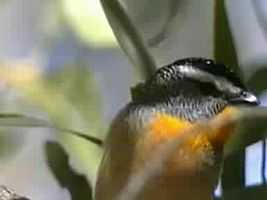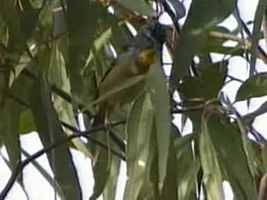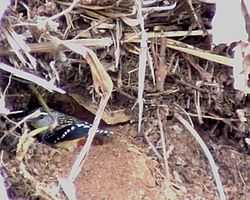Spotted Pardalote
| Spotted Pardalote | |
|---|---|
 | |
| Male with nesting material, Tasmania, Australia | |
 | |
| Female with nesting material, Tasmania, Australia | |
| Conservation status | |
| Scientific classification | |
| Kingdom: | Animalia |
| Phylum: | Chordata |
| Class: | Aves |
| Order: | Passeriformes |
| Family: | Pardalotidae |
| Genus: | Pardalotus |
| Species: | P. punctatus |
| Binomial name | |
| Pardalotus punctatus (Shaw & Nodder, 1792) | |
 | |
| The approximate distribution of the Spotted Pardalote | |
The Spotted Pardalote (Pardalotus punctatus) is one of the smallest of all Australian birds at 8 to 10 cm in length, and one of the most colourful; it is sometimes known as the Diamondbird. Although moderately common in all of the reasonably fertile parts of Australia (the east coast, the south-east, and the south-west corner) it is seldom seen closely enough to enable identification. [citation needed] A distinctive subspecies, the Yellow-rumped Pardalote (race xanthopygus), is found in drier inland regions of southern Australia, particularly in semi-arid Mallee woodlands.
Nesting
All pardalotes have spots and all nest in tunnels at least sometimes; the Spotted Pardalote has the most conspicuous spots and (like the Red-browed Pardalote) always nests in tunnels. Pairs make soft, whistling wheet-wheet calls to one another throughout the day, which carry for quite a distance. One of the difficulties in locating a pardalote is that the contact call is in fact two calls: an initial call and an almost instant response, and thus can come from two different directions.
Numbers
Spotted Pardalote numbers appear to be declining, especially in urban areas,[2] but the species in not considered endangered at this time.[1]
Gallery
- Spotted Pardalote Gallery
-
Singing male Armstrong Creek, Queensland -
Male and female birds burrowing
Thirlmere NSW
References
- ↑ 1.0 1.1 BirdLife International (2012). "Pardalotus punctatus". IUCN Red List of Threatened Species. Version 2013.2. International Union for Conservation of Nature. Retrieved 26 November 2013.
- ↑ "Small insect-eating birds". Birds in Backyards. 9 November 2009. Retrieved 9 August 2011.
External links
- Spotted Pardalote videos, photos & sounds on the Internet Bird Collection.
| Wikimedia Commons has media related to Pardalotus punctatus. |
| Wikispecies has information related to: Pardalotus punctatus |



